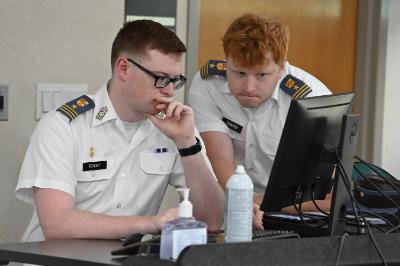Electrical and Computer Engineering
The Department of Electrical and Computer Engineering educates cadets in a rigorous academic environment that nurtures the development of analytic and communications skills applied to the design of electrical and computer engineering hardware and software components and systems, striking a balance between a solid foundation in fundamental principles and practical applied experience, to produce graduates that are prepared for lifelong learning, that exhibit professional engineering practices, and are able to make significant contributions to their profession and society.
- 11-1 Student to Faculty Ratio
- All ECE faculty have Ph.D.'s
- All classes taught by faculty
- Broad Coverage of ECE
The coverage includes circuits, digital systems, and computer architecture, microcontrollers, programmable logic devices, controls, communications, signal processing, and microelectronics.
- Hands-On Laboratories
All courses in the ECE curriculum have a partial or full laboratory component which provides hands-on opportunities that reinforce theory with practical examples of hardware and software systems.
- Independent Study Projects and Design Projects
A variety of projects in many fields are available including biomedical engineering, robotics, and semiconductor fabrication.
Program Educational Objectives:
The department seeks to prepare graduates who, in a few years after graduation, have:
- Established themselves in, and made contributions to, a professional career in industry, government, or the military, and/or are continuing their education in graduate school.
- Remained current in their profession through continuing education, via the completion of graduate coursework, attainment of certifications, or maintenance of active professional licensure, or through personal self-study and/or on-the-job training as part of their career advancement.
Student Outcomes:
The department seeks to prepare students who, by the time of graduation, possess:
- An ability to identify, formulate, and solve complex engineering problems by applying principles of engineering, science, and mathematics.
- An ability to apply engineering design to produce solutions that meet specified needs with consideration of public health, safety, and welfare, as well as global, cultural, social, environmental, and economic factors.
- An ability to communicate effectively with a range of audiences.
- An ability to recognize ethical and professional responsibilities in engineering situations and make informed judgments, which must consider the impact of engineering solutions in global, economic, environmental, and societal contexts.
- An ability to function effectively on a team whose members together provide leadership, create a collaborative and inclusive environment, establish goals, plan tasks, and meet objectives.
- An ability to develop and conduct appropriate experimentation, analyze and interpret data, and use engineering judgment to draw conclusions.
- An ability to acquire and apply new knowledge as needed, using appropriate learning strategies.
The Electrical and Computer Engineering program is accredited by the Engineering Accreditation Commission of ABET, http://www.abet.org, under the commission’s General Criteria and Program Criteria for Electrical, Computer, Communications, Telecommunication(s) and Similarly Named Engineering Programs.
Degrees and Programs
Major(s): Electrical and Computer Engineering
Degree(s): Bachelor of Science (B.S.)
Minor(s):
To give you the most flexibility after graduation, our courses provide a broad foundation in many areas of electrical and computer engineering.
For students seeking specialization in an area, the Electrical and Computer Engineering Department offers a variety of elective courses, as well as customized independent research courses tailored to specific interests. The program culminates with a capstone design experience that includes a competition with other colleges and universities in the southeastern U.S.
Scholarships and Internships
Numerous scholarship and internships are available to cadets majoring in Electrical and Computer Engineering. Scholarships and Awards
Eligibility:
- Students may apply to the ECE Honors Program no earlier than the beginning of their third class year. The application form must be completed and submitted to the Registrar’s Office through the ECE Department Head.
- Applicants must have a minimum cumulative GPA of 3.00 and a minimum ECE GPA of 3.30.
Requirements:
- Students must maintain a minimum cumulative GPA of 3.00 and a minimum ECE GPA of 3.30 in order to remain in the ECE Honors Program and be eligible for ECE Honors upon graduation.
- Students must submit an honors thesis proposal to the ECE Department Head no later than the end of the second class year. The honors thesis proposal must include the following:
- A description of the project
- Approval of the project advisor(s)
- Students must complete (with no grades below B) a minimum of 3 hours of Undergraduate Research in ECE (EE 491-496) or ECE Internship for Credit (EE 469).
- Students must present the results of their work in an external professional forum, such as IEEE, NCUR, ASEE, etc.
- At the conclusion of their project, but no later than one week before the end of classes that semester, students must submit their final honors thesis to their project advisor(s) and the ECE Department Head for approval.
ECE in the News
Find out more about the department's cadets and faculty in recent VMI news.

ECE Cadets Present Capstone Projects
Two teams of senior electrical and computer engineering (ECE) majors at Virginia Military Institute recently presented their capstone projects after working on them throughout the academic year.

Honors Week: Cadet Completes Work on App
When Col. James Squire’s son was misdiagnosed with hearing loss, he began a years-long project to help parents understand how their children hear. Over nine years, three VMI cadets developed an app that simulates hearing loss using real audiograms.
.svg)
.png)